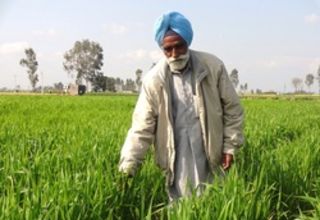Comrade Avtar Singh, Chaharke, Jalandhar - A farmer with midas touch

It’s difficult to miss Comrade Avtar Singh and his motor bike. Both of them live at Chaarke village near Jalandhar and make their presence felt in their own unconventional way. The bike runs on electricity while Mr Singh swears by organic farming, the two concepts yet to get their due in Punjab where subsidies on diesel and agrochemicals lure farmers.
Talk to the old man and he narrates how his family has been dedicated to the cause of environment and humanity for many years. “I had been experimenting with natural/organic farming for some time, but lack of guidance always stopped him from shunning fertilizers and pesticides altogether. The moment of reckoning came when my nephew died of blood cancer in 2005. I decided that to save my family and others from this danger, I have to go chemical free,” ,” he shares. Thankfully, his two sons stood by his decision and today they don’t use any chemical on 12 acre of their farms.
What also came as a good motivator was a pilot scheme launched by organic wing of the state agriculture department which promised Rs 10,000 per acre to those who start chemical-free farming on 5 acres. Though the money never came, Comrade Avtar Singh got some basic information from the department. As the interest rose, he also visited the organic farm of Pingalwara Society near Amritsar and got in touch with Kheti Virasat Mission (KVM) in 2012 through a friend. Having attended several workshops and with hands-on experience, the old man, whom people mocking called ‘insane’, has turned into a much sought after teacher who knows everything about going organic.
This turnaround came as other farmers noticed how the yield has increased in his farm with lesser inputs. The chemical fertilzers have been replaced with natural ‘Jeev Amrit’ which has cow dung, neem leaves, jaggery and other easily available natural items as ingredients. On the other hand, lassi (butter milk) gives pesticides a good run for their money. Comrade Avtar Singh also stopped burning the straw. “With organic farming, the yield increases gradually with each passing year as the soil, spared of chemical onslaught and given natural inputs, replenishes its nutrient value. So, the farmer needs to be patient. Today, my fields are beating neighbouring farms in producing better quality and better quantity wheat and rice. The savings on seeds, pesticides, fertilizer and water add to the profit,” he says proudly. While no chemical is used, the seeds requirement has dropped to half and water use by 70 per cent.
A major aspect of organic farming is to make maximum of the naturally available resources. Using lesser seeds means more spacing between plants thus helping them receive ample sunlight and air ensuring better growth. “On the water front, farmers tend to go for flood irrigation which chokes the plant roots, reduces their growth and invites pests. To deal with these issues, more and more fertilizers and pesticides have to be used. But the fact is that plants only need moisture in the soil to grow. Irrigating alternate channels force their roots to spread out in search of water and hence ensure robust growth,” Mr Singh asserts.
The man has also found the good use for weeds. He believes that they should not be looked down as problematic as they help fix nitrogen and if buried increase biomass of the soil. Regarding the current situation of farming in Punjab, he has a simple take. “The agriculture in Punjab will start improving once farmers start going to their fields. Right now, they are only directing labourers over mobile phones. Once they start getting their hands dirty in the soil again, they will know what it demands. Then they will also stop listening to fertilizer and pesticide companies which advise extensive and blind use of their products,” he says. But he’s not the one to be pessimistic. “My crops fetch better price due to their quality. Every day I get calls from farmers seeking guidance on how to go organic. This means number of people wanting to grow and buy organic food is growing with each passing day. That has to be because we can’t survive without aligning with nature,” he quips.
Contribution By Manu Moudgil